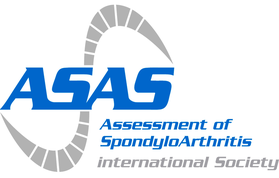ASAS-EULAR recommendations for the management of axSpA – 2022 update
Background: Since the last version of the ASAS-EULAR recommendations for the management of axSpA from 2016, there was an important body of new evidence justifying an update of the recommendations.
Objectives: To update the ASAS-EULAR recommendations for the management of axial spondyloarthritis (axSpA).
Methods: Following the EULAR Standardised Operating Procedures, two systematic literature reviews were conducted on non-pharmacological and pharmacological treatment of axSpA [1, 2]. In a task force meeting the evidence was presented, discussed, and overarching principles and recommendations were updated, followed by voting.
Results: Five overarching principles and 15 recommendations with a focus on personalised medicine were agreed: eight remained unchanged from the previous recommendations; three with minor edits on nomenclature; two with relevant updates (#9,12); two newly formulated (#10,11). The first 5 recommendations focus on treatment target and monitoring, non-pharmacological management and non-steroidal anti-inflammatory drugs (NSAIDs) as first choice pharmacological treatment. Recommendations 6-8 deal with analgesics and discourage long-term glucocorticoids and conventional synthetic DMARDs for pure axial involvement. Recommendation 9 describes the indication of biological DMARDs (bDMARDs i.e. TNFi, IL-17i) and targeted synthetic DMARDs (tsDMARDs i.e. JAKi) for patients who have ASDAS≥2.1 and failed ≥2 NSAIDs and also have either elevated CRP, MRI inflammation of sacroiliac joints or radiographic sacroiliitis. Current practice is to start a TNFi or IL-17i. Recommendation 10 addresses extra-musculoskeletal manifestations with TNF monoclonal antibodies preferred for recurrent uveitis or inflammatory bowel disease, and IL-17i for significant psoriasis. Treatment failure should prompt re-evaluation of the diagnosis and consideration of the presence of comorbidities (#11). If active axSpA is confirmed, switching to another b/tsDMARD is recommended (#12). Tapering, rather than immediate discontinuation of a bDMARD, can be considered in patients in sustained remission (#13). The last recommendations (#14,15) deal with surgery and spinal fractures.
Conclusions: The 2022 ASAS-EULAR recommendations provide up-to-date guidance on the management of patients with axSpA [3].
Timelines of the project: 2021-2022
Project Team
PIs: Désirée van der Heijde (Leiden, the Netherlands) and Sofia Ramiro (Leiden and Heerlen, the Netherlands)
Methodologists: Elena Nikiphorou (London, UK), Alexandre Sepriano (Lisboa, Portugal)
Fellows: Augusta Ortolani (Padova, Italy), Casper Webers (Maastricht, the Netherlands)
Steering committee: Robert Landwé (Amsterdam and Heerlen, the Netherlands), Xenofon Baraliakos (Herne, Germany)
Working group:
Filip van den Bosch (Ghent, Belgium)
Boryana Boteva (Sofia, Bulgaria)
Ann Bremander (Sønderborg, Denmark)
Philippe Carron (Ghent, Belgium)
Adrian Ciurea (Zurich, Switzerland)
Floris van Gaalen (Leiden, the Netherlands)
Pál Géher (Budapest, Hungary)
Lianne Gensler (San Francisco, United States of America)
Josef Hermann (Graz, Austria)
Manouk de Hooge (Ghent, Belgium)
Markéta Hušáková (Prague, Czech Republic)
Uta Kiltz (Herne, Germany)
Clementina López-Medina (Cordoba, Spain)
Pedro Machado (London, UK
Helena Marzo-Ortega (Leeds, UK)
Anna Molto (Paris, France)
Victoria Navarro-Compán (Madrid, Spain)
Michael Nissen (Geneva, Switzerland)
Fernando Pimentel-Santos (Lisboa, Portugal)
Denis Poddubnyy (Berlin, Germany)
Fabian Proft (Berlin, Germany)
Martin Rudwaleit (Bielefeld, Germany)
Mark Telkman (Oxford, UK)
Sizheng Steven Zhao (Manchester, UK)
Nelly Ziade (Beirut, Lebanon)
Publications
- Ortolan A, Webers C, Sepriano A, Falzon L, Baraliakos X, Landewe RB, Ramiro S, van der Heijde D, Nikiphorou E. Efficacy and safety of non-pharmacological and non-biological interventions: a systematic literature review informing the 2022 update of the ASAS/EULAR recommendations for the management of axial spondyloarthritis. Ann Rheum Dis. 2023 Jan;82(1):142-152
- Webers C, Ortolan A, Sepriano A, Falzon L, Baraliakos X, Landewe RBM, Ramiro S, van der Heijde D, Nikiphorou E. Efficacy and safety of biological DMARDs: a systematic literature review informing the 2022 update of the ASAS-EULAR recommendations for the management of axial spondyloarthritis. Ann Rheum Dis. 2023 Jan;82(1):130-141
- Ramiro S, Nikiphorou E, Sepriano A, Ortolan A, Webers C, Baraliakos X, Landewe RBM, Van den Bosch FE, Boteva B, Bremander A, Carron P, Ciurea A, van Gaalen FA, Geher P, Gensler L, Hermann J, de Hooge M, Husakova M, Kiltz U, Lopez-Medina C, Machado PM, Marzo-Ortega H, Molto A, Navarro-Compan V, Nissen MJ, Pimentel-Santos FM, Poddubnyy D, Proft F, Rudwaleit M, Telkman M, Zhao SS, Ziade N, van der Heijde D. ASAS-EULAR recommendations for the management of axial spondyloarthritis: 2022 update. Ann Rheum Dis. 2023 Jan;82(1):19-34
- Ramiro S, Nikiphorou E, Sepriano A, Ortolan A, Webers C, Baraliakos X, Landewé RB, van der Heijde D. Response to: Correspondence on “ASAS-EULAR recommendations for the management of axial spondyloarthritis: 2022 update” by Ramiro et al. Ann Rheum Dis. 2023 Mar 6:ard-2023-223937. [Epub ahead of print]
